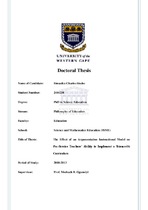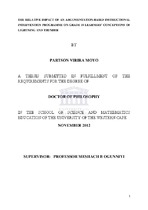The effect of an argumentation instructional model on pre-service teachers' ability to implement a science-IK curriculum
Abstract
This study investigated the effect of an Argumentation Instructional Model (AIM) on the preservice teachers‘ ability to implement a Science-IK Curriculum in selected South African schools. I examined what instructional practices the pre-service teachers engage in when they introduce scientific explanation and whether those practices influence learners‘ ability to construct scientific explanations during a natural science unit of a South African school curriculum. My study began with a pilot study of 16 pre-service science teachers who completed a B.Ed university module, Science for Teaching, which included an IK component. Data collection for main study took place from 2010 to 2011, and used questionnaires, face-to-face and reflective interview protocols, case studies, lesson plans and classroom observation schedules. I took videos and audios of each of the pre-service teacher‘s enactment of the focal lesson on argumentation and then coded the videotape for different instructional practices. The study investigated firstly, what currently informed teachers‘ thinking, knowledge and action of IK. Secondly, the research questioned how teachers interpreted and implemented IK in the science classroom. A sample of the three pre-service teachers were followed into their classrooms to investigate how they specifically implemented Learning Outcome Three using argumentation instruction as a mode of instruction and what approaches relevant to the inclusion of IK were developed. The study found that the three pre-service teachers used three very different approaches through which IK was brought in the science curriculum. An assimilationist approach, that brings IK into science by seeking how best IK fits into science. A segregationist approach that holds IK side-by-side with scientific knowledge. Lastly, an integrationist approach makes connections between IK and science. The approaches developed by the pre-service teachers were found to be informed by their biographies, values, cultural backgrounds and worldviews. Meticulously, the study explored how shifts were being made from a theoretical phase at the university where the pre-service teachers engaged IK to an actual phase of implementation in their school science classrooms. Finally, I attempted to explain why the pre-service teachers interpreted and implemented IK in the way they did.
Collections
Related items
Showing items related by title, author, creator and subject.
-
The application of cooperative learning to enhance the teaching of Nature of Science for scientific literacy advancement in secondary school physical science students
Spellman, Nomonde (University of the Western Cape, 2018)The purpose of this study was to explore, demonstrate and apply cooperative learning when explicitly exposing Nature of Science (NoS) to physical science secondary students aiming at advancing scientific literacy. Secondary ... -
An investigation of Zimbabwe a-level chemistry teachers' epistemological beliefs, laboratory instructional practices and students' images of the nature of science
Vhurumuku, Elaosi (University of the Western Cape, 2004)This study set out to investigate the nature of A-level Chemistry teachers' science epistemological beliefs, the teachers' laboratory instructional practices and their students' images of science. Science epistemological ... -
The relative impact of an argumentation-based instructional intervention programme on grade 10 learners’ conceptions of lightning and thunder
Moyo, Partson Virira (2012)The basic premise of this study was that when a learner is confronted with two contradictory explanations of the same phenomenon, there is cognitive dissonance in the learner as the learner tries to determine which of the ...




